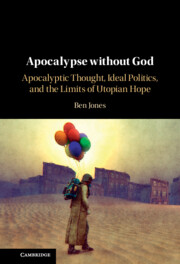Apocalypse without God
Apocalypse, it seems, is everywhere. Preachers with vast followings proclaim the world’s end. Apocalyptic fears grip even the nonreligious amid climate change, pandemics, and threats of nuclear war. As these ideas pervade popular discourse, grasping their logic remains elusive. Ben Jones argues that we can gain insight into apocalyptic thought through secular thinkers. He starts with a puzzle: Why would secular thinkers draw on Christian apocalyptic beliefs – often dismissed as bizarre – to interpret politics? The apocalyptic tradition proves appealing in part because it theorizes a relation between crisis and utopia. Apocalyptic thought points to crisis as the vehicle to bring the previously impossible within reach, offering resources for navigating challenges in ideal theory, which involves imagining the best, most just society. By examining apocalyptic thought’s appeal and risks, this study arrives at new insights on the limits of utopian hope. This title is available as open access on Cambridge Core.
Ben Jones is the Assistant Director of Penn State’s Rock Ethics Institute and has a Ph.D. in political science from Yale University. His research has appeared in the Journal of Applied Philosophy, European Journal of Political Theory, Political Research Quarterly, and other venues, including popular outlets like The Washington Post.

